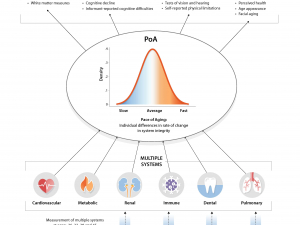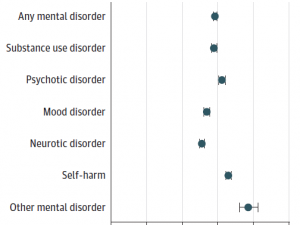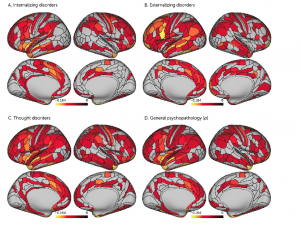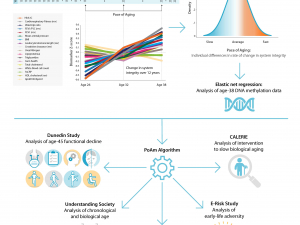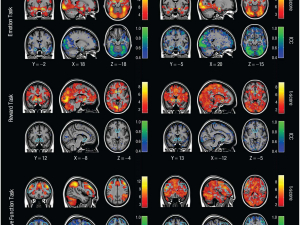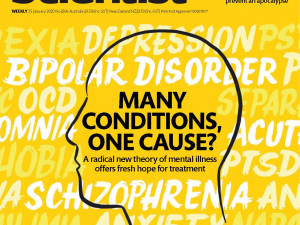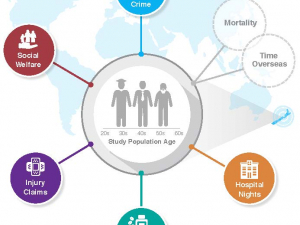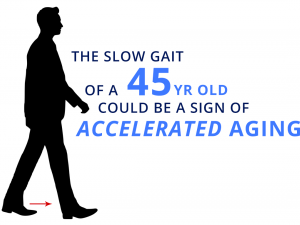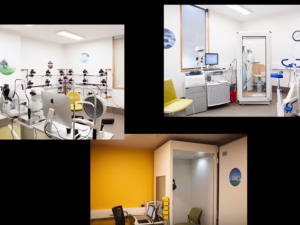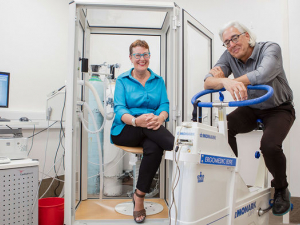CrimComics offers a new way to approach criminological theory by engaging students with impactful, highly visual illustrated texts. The July 2021 issue introduces students to developmental and life-course criminological theories, focusing on the works of Michael Gottfredson and Travis Hirschi, Robert Sampson and John Laub, and our ownTerrie Moffitt. Read more read more about Terrie Moffitt Featured in CrimComics Magazine »
Riley weaves important insights about diagnostic practices and mental health research with his own life story. Compelling reading! Read more here. read more about Fascinating article by Alex Riley about the p factor, appearing in Aeon. »
A multidecade study of young adults living in the United Kingdom has found higher rates of mental illness symptoms among those exposed to higher levels of traffic-related air pollutants, particularly nitrogen oxides, during childhood and adolescence. Read more here. read more about 'Childhood Air Pollution Exposure Linked to Poor Mental Health at Age 18' »
Temi did a fun 20-min podcast to announce her talk in the King’s College London, Inst of Psychiatry’s annual research festival on 27 April. It’s being promoted by Mental Elf, a UK NGO that disseminates information about mental health to the public. There is a 20-min podcast link below, and also a tweet if you care to help send it. The topic is: “What surprises we got by following 1000 people’s mental health for decades.” Soon there will be a blog as well, by professional mental health blogger, Dona Matthews. Very… read more about Podcast: Surprises Found By Following 1000 People’s Mental Health »
We tracked age-related declines in multiple organ systems across 20 years and found that, already by midlife, those aging fastest showed cognitive declines, signs of brain aging, diminished sensory-motor function, and negative views about aging. People who are aging more rapidly than same-age peers are simultaneously at higher risk for health challenges and future frailty as well as age-based discrimination. Read more here. read more about People of the same chronological age vary greatly in their biological age, which has implications for frailty risk and for policy »
At age 45, study participants who had previously experienced more mental health problems were aging at a faster pace, had greater declines in sensory, motor and cognitive function, and were rated as looking older than their peers. Results suggest that the prevention of psychopathology and monitoring of individuals with mental health problems for signs of accelerated aging may have the potential to reduce health inequalities and extend healthy lives. Read more here. read more about Mental health problems are linked with faster aging in middle age »
Join Sean Sanders, Director and Senior Editor for Custom Publishing at Science, as he interviews outstanding researchers in a broad range of fields whose work either directly involves the study of children and adolescents or has a significant impact in their lives. Listen here. read more about Could Studying Children Teach Us About Ageing? »
The same people who experience psychiatric conditions when they are young go on to experience excess age-related physical diseases and neurodegenerative diseases when they are older adults. Young people with mental health problems go on to become very costly patients in later life. Treating young people’s mental-health problems is a window-of-opportunity to prevent future physical diseases in older adults. This makes mental health care a key weapon in the fight to reduce the societal burden of age-related diseases.… read more about The same people who have psychiatric conditions when young get excess age-related physical diseases when old. »
“Everyone fears an old age that’s sickly, poor, and lonely, so aging well requires us to get prepared, physically, financially, and socially,” said Terrie Moffitt, last author on the paper. “We found people who have used self-control since childhood are far more prepared for aging in these 3 areas of life than their same-age peers. But if you aren’t prepared for a good old age yet, your 50’s is not too late to get ready!” Moffitt added. Read article here. EurekAlert can be found here. read more about Childhood self-control forecasts the pace of midlife aging and preparedness for old age »
The geroscience agenda: What does stress have to do with it? Elissa S. Epel Social hallmarks of aging: Suggestions for geroscience research. Eileen M. Crimmins Behavioral and social research to accelerate the geroscience. Terrie Moffitt read more about Three new essays in issue 63 of Aging Research Reviews, by Moffitt, Crimmins, and Epel, highlight the value of behavioral and social research for geroscience »
August, 2020 - The Origins of You is now published. After tracking the lives of thousands of people from birth to midlife, four of the world’s preeminent psychologists reveal what they have learned about how humans develop. More information about the book can be found here. read more about The Origins of You: How Childhood Shapes Later Life »
Terrie Moffitt investigates whether there is such a thing as a criminal mind, and whether adolescent delinquency forecasts a life of crime. Now, after decades of grappling with these big questions, she has some answers. Read more here. read more about What Makes a Criminal? »
A pattern of pervasively reduced neocortical thickness appears to be common across all forms of mental disorders and may represent a transdiagnostic feature of general psychopathology. Read more here. read more about Pervasively thinner neocortex as a transdiagnostic feature of general psychopathology »
We report a blood-DNA-methylation measure that is sensitive to variation in pace of biological aging among individuals of the same chronological age. Editorial by Jamie Justice and Steve Kritchevsky here. read more about Quantification of the pace of biological aging in humans through a blood test, the DunedinPoAm DNA methylation algorithm »
Task-fMRI is a widely used method to probe human brain activity. However, the reliability of many of the most commonly-used task-fMRI measures is unknown. In this research, we performed a meta-analysis as well as novel empirical research and we found that many commonly used task-fMRI measures have poor reliability and are not currently suitable for biomarker discovery or individual differences research. Read more here. Studies of brain activity aren't as useful as scientist thought. Read article… read more about What is the test-retest reliability of common task-fMRI measures? New empirical evidence and a meta-analysis »
Tracking 1000 people’s mental health for 4 decades reveals frequent shifts across different successive disorders, raising the question: why study or treat mental disorders one at a time if most disorders share common causes? Read more here. read more about Mental-disorder life-histories shift among different successive disorders, as revealed by following 1000 people over four decades »
Studies with behavioural and neuropsychological tests have supported the developmental taxonomy theory of antisocial behaviour, which specifies abnormal brain development as a fundamental aspect of life-course-persistent antisocial behaviour, but no study has characterised features of brain structure associated with life-course-persistent versus adolescence-limited trajectories, as defined by prospective data. We aimed to determine whether life-course-persistent antisocial behaviour is associated with neurocognitive… read more about Associations between life-course-persistent antisocial behaviour and brain structure in a population-representative longitudinal birth cohort »
The p-factor of mental disorder made the cover of The New Scientist! Very nice article by Dan Jones explains our team’s novel approach to mental health research. Read more here. read more about Many conditions, one cause? A radical new theory of mental illness offers fresh hope for treatment »
A new study of administrative data on 4 million citizens from New Zealand and Denmark identifies a small segment of the population that relies heavily on multiple health and social services. The findings, which appear Jan. 20 in Nature Human Behaviour, reveal that this population segment was likely to have left secondary school early and had high rates of mental-health problems as adolescents, pointing to a need for prevention efforts among young people. Read full article here. Salvation or stigma? Case made for… read more about New study of 4 million citizens in two nations identifies very high-rate users of multiple public services in a small segment of the population »
Higher education institutions like Duke are gateways to opportunity and success for many low-income and first-generation college students. They are also home to professors who once stood in those students’ shoes and used their education to get into academia. Here are some professors from Duke who were low-income, first-generation (LIFE) college students. Jen’nan Read: Sally Dalton Robinson professor of sociology, chair of the department of sociology Jen’nan Read was born in the United States and moved to… read more about Professors from low-income first-generation backgrounds are ready to help Duke students »
Drs. Terrie Moffitt and Avshalom Caspi of the Department of Psychology & Neuroscience have been named the 2019 Outstanding Postdoc Mentors at Duke. Read more here. read more about Moffitt and Caspi are awarded "Outstanding Mentor" award at Duke University »
Gait speed (how fast you walk) is not only an indicator of your physical well-being but also an index of the health of your brain. These findings are based on the Dunedin Study, which has followed a birth cohort of 1,000 children born in the early 1970s to age 45 years. The findings, which appear on October 11 in JAMA Network Open, reveal that midlife adults with slower gait speed showed evidence of accelerated biological aging and greater declines in their cognitive functioning from childhood to midlife. A most… read more about Association of Neurocognitive and Physical Function With Gait Speed in Midlife »
Aaron Reuben has a new article about Nature and Health, in Outside magazine. Available here. The article and author are also featured in a podcast on "The Doctors Prescribing Nature" by Outside magazine. Listen here, or find it on Apple Podcasts here. read more about Ph.D. Student (and science journalist) Aaron Reuben has a new article about Nature and Health, in Outside magazine »
Lead exposure in childhood appears to have long-lasting negative effects on mental health and personality in adulthood, according to a study of people who grew up in the era of leaded gasoline. The findings, which will appear Jan. 23 in JAMA Psychiatry, reveal that the higher a person's blood lead levels at age 11, the more likely they are to show signs of mental illness and difficult personality traits by age 38. Read full article here. read more about Childhood lead exposure is associated with adult personality difficulties and lifelong poor mental health »
Terrie E. Moffitt, Ph.D., the Nannerl O. Keohane University Professor of Psychology and Neuroscience at Duke, has been elected to the National Academy of Medicine, an honorific society for exceptional leaders. Established by Congress in 1863, the National Academies of Sciences, Engineering and Medicine provide objective advice to policy makers on matters of science, technology, and health. Moffitt joined Duke in 2009 with her husband and co-author, Avshalom Caspi, as members of the Institute for Genome Sciences &… read more about Terrie Moffitt Elected to National Academy of Medicine »
55,000 people completed the BBC Loneliness Experiment. Claudia Hammond reveals the results and discovers the loneliest times of life and the top solutions in tackling loneliness. The documentary features interviews with researchers from the E-Risk Study. View the 3-part documentary. read more about The Anatomy of Loneliness »
Recognizing excellence in North Carolina Modernist Residential Design, Drs. Moffitt & Caspi's farm house received third place honors for the George Matsumoto Prize — the 2018 NC Modernist Houses architectural competition. Learn more about the award-winning residence in the video below. read more about Farm House Receives Architectural Recognition »
Association for Psychological Science Fellow Terrie E. Moffitt has been named the NIH Matilda White Riley Behavioral and Social Sciences Honors Distinguished Lecturer, and several psychological scientists have won the Matilda White Riley Early Stage Investigator Paper Competition. Read the story on the Association for Psychological Science website, or view the award photos on Flickr. read more about Terrie Moffitt named NIH Matilda White Riley Behavioral and Social Sciences Honors Distinguished Lecturer »
Drs. Moffitt & Caspi provide a 10-minute overview of the exciting new data that are being collected as part of the age-45 assessment in the Dunedin Study. read more about Data Collection in Phase 45 of the Dunedin Study »
In 1987, Avshalom Caspi and Terrie Moffitt, two postdocs in psychology, had adjacent displays at the poster session of a conference in St. Louis, Missouri. Caspi, generally not a forward man, looked over at Moffitt's poster and was dazzled by her science. "You have the most beautiful data set," he said. Not one to be easily wooed, Moffitt went to the university library after the meeting and looked up Caspi's citations. Yep, he'd do. "It was very nerdy," Caspi recalls. "We fell in love over our data." It's been a personal… read more about Two psychologists followed 1000 New Zealanders for decades. Here’s what they found about how childhood shapes later life »




